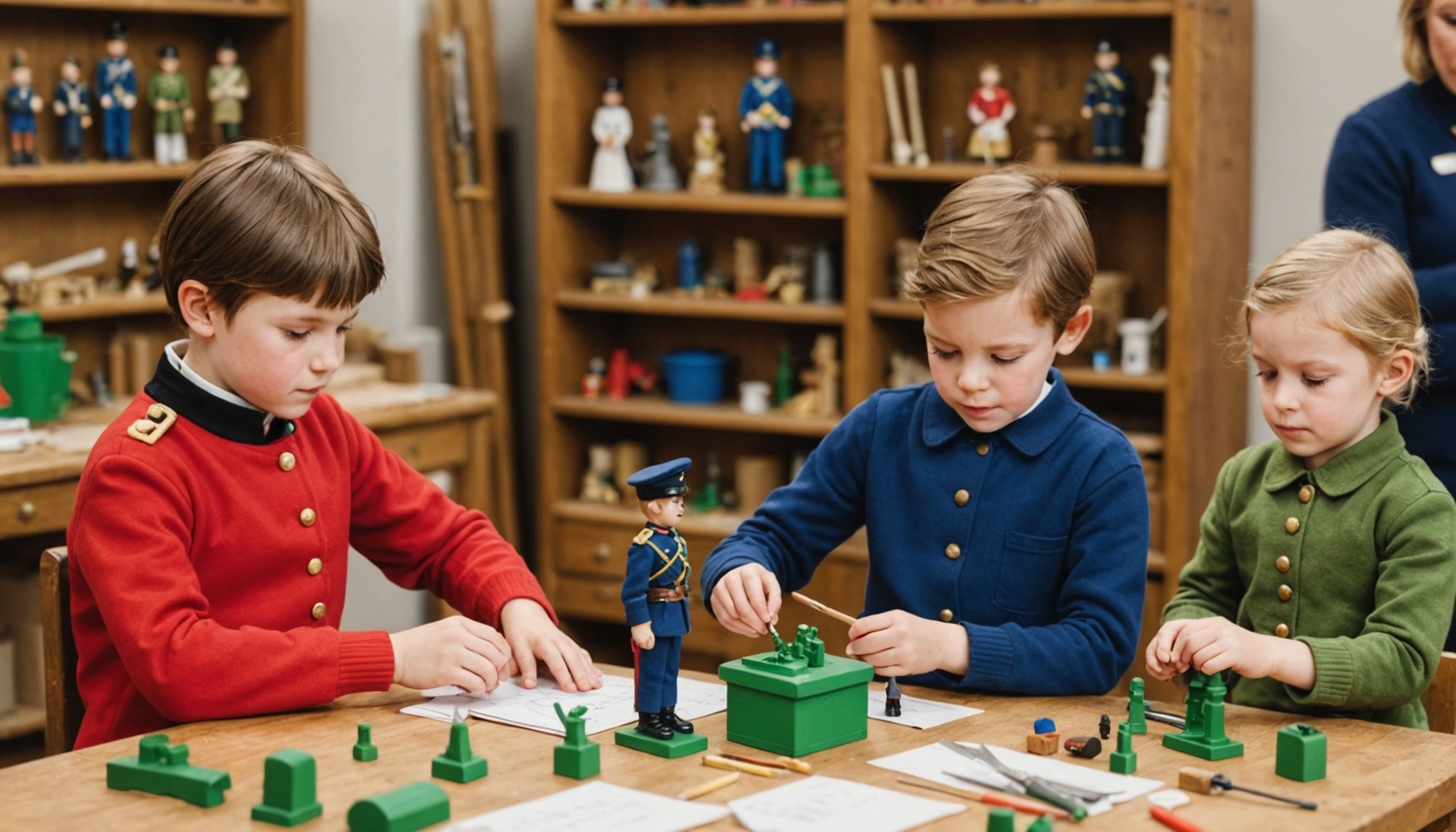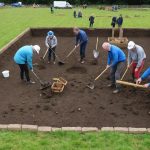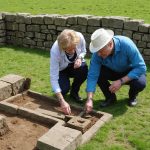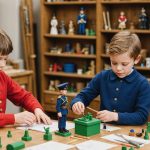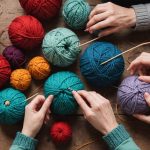Overview of Toy Soldier Crafting in the UK
In the UK, toy soldier workshops have long been a cornerstone of the rich crafting culture, celebrating both historical and artistic pursuits. Historically, these workshops have provided a means to hone skills while immersing oneself in tales of British military history. This unique combination of crafting and storytelling has amplified the significance of toy soldier making in British craftsmanship.
The popularity of crafting hobbies, including toy soldiers, has witnessed a considerable resurgence. Many Britons find solace in such tactile activities, especially as they allow a departure from screens and digital interaction. Crafting workshops have become vibrant communities where individuals share a common interest and enthusiasm for model making.
Have you seen this : Explore the Riches of Marine Archaeology: Top UK Coastal Towns Offering In-Depth Guided Tours
Hands-on workshops are particularly beneficial for skill development. They teach valuable techniques in painting and assembly, offering participants a sense of accomplishment. Moreover, these workshops provide an opportunity to learn from seasoned craftsmen, who share their expertise and passion for the craft. This exchange of knowledge not only enhances skills but also fosters a sense of camaraderie among enthusiasts.
In this ever-growing crafting culture, British craftsmanship continues to thrive, with toy soldier workshops at its heart, nurturing creativity and community spirit.
In the same genre : Explore the Top UK Festivals for a Deep Dive into Enchanting British Folk Tales
Top Locations for Toy Soldier Crafting Workshops
Discovering the best UK workshops for toy soldier crafting reveals a plethora of exciting and diverse options for enthusiasts.
Location 1: The Toy Soldier Workshop
Nestled in an easily accessible urban area, The Toy Soldier Workshop offers a vibrant space for creating miniature warriors. This venue prides itself on accommodating all skill levels, ensuring a welcoming atmosphere for beginners and seasoned crafters alike. Participants can choose from a wide array of crafting styles, from traditional designs to contemporary interpretations.
Testimonials highlight the hands-on experiences, with many attendees praising the knowledgeable instructors who guide through the intricacies of toy soldier crafting, giving insightful tips tailored to individual needs. Whether using metal, plastic, or resin, each session offers a new opportunity to master this intricate art form.
Location 2: British Toy Soldiers Museum
Step into history at the British Toy Soldiers Museum, where workshops are enriched by a profound historical context. Skill levels range from novice to expert, with programs tailored to teach various crafting techniques symbolic of different eras. This venue showcases the significance of toy soldiers in cultural history, adding depth to every crafting session.
Pricing is competitive, ensuring accessibility for all, and workshops can be booked online. Visitors appreciate the museum’s ability to blend education with creativity, providing them with not only crafted soldiers but also a deeper understanding of their historical importance.
Location 3: The Crafty Soldier Studio
The Crafty Soldier Studio stands out with its unique crafting atmosphere. Offering an eclectic mix of materials and techniques, attendees are encouraged to explore beyond conventional methods, making it a haven for creative minds. This workshop offers regular sessions and special themed events, ensuring a dynamic and evolving crafting schedule.
Participants relish the open-ended creative environment, often leaving with newfound inspiration for personal projects. The studio is praised for its flexible schedules, allowing participants to engage deeply with each project at their own pace, fostering a fulfilling workshop experience.
Types of Crafts and Techniques Explored
Different crafting techniques in toy soldier making offer a wealth of opportunities for personalisation and improvement of hands-on skills. Beginners might start with basic assembly using pre-moulded pieces, which primarily requires careful handling and basic model glue application. This approach can help crafters to develop precision and attention to detail. Intermediate crafting techniques include customisation and painting, allowing those with more experience to experiment with colours and patterns to create unique appearances. The skill levels required vary; while beginners can manage assembling kits, painting and customisation demand creativity and understanding of colour theory.
For advanced crafters, techniques such as sculpting, converting, and creating dioramas offer a deeper level of engagement. Sculpting demands skills in shaping and detailing material like clay or epoxy putty, transforming a standard model into an artistic expression. Converting involves modifying existing models to alter their poses or add new elements, testing creativity and problem-solving abilities. Each crafting style not only enhances technical skills but also provides an opportunity to infuse craftsmanship with personal flair, allowing enthusiasts to develop a distinct style in their toy soldier collections.
Participant Experiences and Feedback
Participants of the workshops consistently highlight their positive experiences through detailed reviews. They often mention the engaging format and the wealth of knowledge they gain. Testimonials reveal enriching stories where attendees express how the workshops have not only expanded their understanding but also bolstered their confidence. A common sentiment in participant testimonials is the appreciation for the inclusive environment that allows everyone to voice their thoughts and learn from each other.
The community aspect plays a significant role. Workshops are structured to foster networking, providing ample opportunities for attendees to interact, share ideas, and form lasting connections. Community building becomes a fundamental part of the experience, with many participants noting how these interactions lead to fruitful collaborations outside the workshop setting.
In response to participant feedback, organisers are open to suggestions, welcoming improvements to make future events even more impactful. Suggestions often focus on extending discussion times and incorporating more hands-on activities. By incorporating these insights, workshops continue to evolve, enhancing both the learning and networking opportunities for all involved. This commitment to adaptability ensures that each event meets the needs and expectations of its participants.
Booking Information and Tips
Navigating the workshop booking process can be straightforward with the right guidance. Whether you’re keen on enhancing your skills or diving into a new hobby, the following insights are here to assist you.
How to Book a Workshop
Securing a spot in your chosen workshop starts with selecting a reliable platform. Many workshops offer a direct booking system on their websites, while others might require emailing a contact for more details. For ease, ensure you have your payment details ready and check the cancellation policy before finalising a booking.
Pricing Breakdown
Workshop pricing can vary widely based on the type and duration of the course. Generally, workshops range from modest one-day classes priced around £50, to more intensive ones reaching upwards of £300. Look out for potential discounts; some providers offer early bird rates or package deals when booking multiple sessions.
Scheduling Considerations
Timing is crucial when scheduling your workshop. It’s advisable to consider weekdays if you prefer quieter sessions. Additionally, many workshops offer seasonal themes or special events, so aligning your schedule with these can provide a unique experience. Always check for availability early, as some popular workshops fill up quickly.
Conclusion: The Value of Engaging in Crafting
Diving into the world of crafting can be immensely rewarding. Crafting benefits extend beyond creating beautiful items; it fosters a sense of achievement and relaxation. Participating in workshops offers invaluable experiential learning, allowing hands-on exploration of materials and techniques. This setting encourages interaction, sharing of ideas, and peer learning, enriching the crafting experience.
For those seeking creative outlets, crafting provides an excellent avenue to express oneself and discover new hobbies. Engaging in crafting not only allows creativity to flourish but also cultivates patience and problem-solving skills. These skills can translate to various aspects of life, enhancing personal development.
We encourage you to explore local crafting opportunities. Many communities offer workshops specifically designed for different skill levels, ensuring no one is left out regardless of their previous experience. These sessions can be a delightful way to meet like-minded individuals and can significantly boost your crafting confidence.
Consider embarking on a toy soldier crafting journey as a starting point. This activity is not only enjoyable but also serves as a perfect example of how crafting can be both an educational and entertaining experience. With the right tools and guidance, crafting can revolutionise your leisure time into a fulfilling and productive pursuit.

